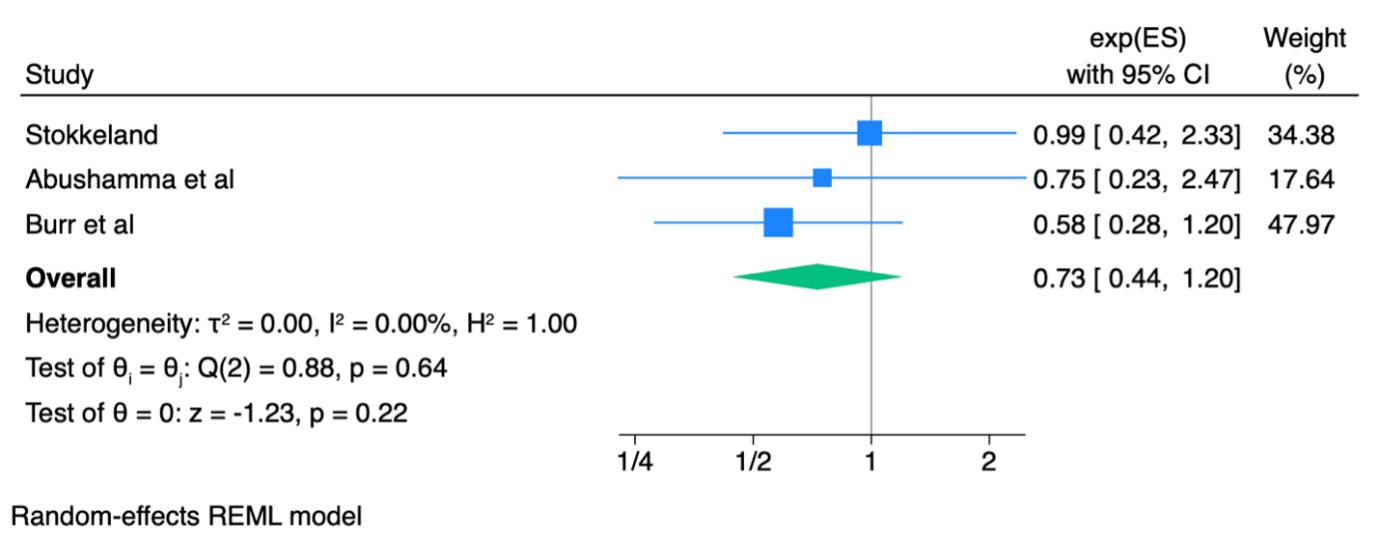Monday Poster Session
Category: Biliary/Pancreas
P2147 - Use of Statin for Primary Sclerosing Cholangitis: A Systematic Review and Metaanalysis
Monday, October 27, 2025
10:30 AM - 4:00 PM PDT
Location: Exhibit Hall

Gedion Yilma Amdetsion, MD (he/him/his)
Cook County Health
Chicago, IL
Presenting Author(s)
Gedion Yilma Amdetsion, MD1, Chun-wei Pan, MD1, Hiwot G. Tebeje, MD, MPH2, Michael G. Tebeje, MD, MPH3, Michael Shimelash, MD, MSc(Epi)4, Seema Gandhi, MD5
1Cook County Health, Chicago, IL; 2Washington University in St. Louis, Saint Louis, MO; 3Washington University in St. Louis, St. Louis, MO; 4University Medical Center Groningen, Groningen, Groningen, Netherlands; 5John H. Stroger Hospital of Cook Co, Chicago, IL
Introduction: Primary sclerosing cholangitis (PSC) is a progressive cholestatic liver disease lacking effective medical therapies. Statins, known primarily for cholesterol reduction, exhibit potential anti-inflammatory and antifibrotic properties, raising interest in their utility for PSC management.
Methods: This systematic review adhered to PRISMA and Meta-analysis of Observational Studies in Epidemiology guidelines. We searched PubMed, Scopus, and Web of Science databases from inception to March 12, 2025, for studies evaluating the use of statins for patients with primary sclerosing cholangitis. Human studies without language restrictions were considered. Eligible studies were cohort or cross-sectional designs reporting ORs or HRs with 95% CIs. Studies involving participants under 18, case reports, reviews, practice guidelines, commentaries, or editorials were excluded.
Results: From 73 records identified (PubMed: 12, Embase: 32, Web of Science: 29), 13 studies underwent full review. Four studies were eligible for quantitative synthesis. Meta-analysis demonstrated a non-significant trend toward benefit with statin use in PSC (pooled random-effects Odds ratio = 0.729; 95% CI: 0.442–1.204). Trim-and-fill analysis detected no evidence of publication bias (p=0.7093). In qualitative synthesis, it was illustrated that statins reduced the incidence of cholangitis and strictures, but due to high heterogeneity, quantitative synthesis wasn't undertaken.
Discussion: Current evidence suggests that statins don’t reduce the incidence of cholangiocarcinoma in patients with PSC, but they may be beneficial in protecting against cholangitis and strictures. Further high-quality randomized trials and well-designed and carefully executed studies are needed to shed light on the protective role of statins.

Figure: Fig 1. Forrest plot of included studies showing the impact of statin on incidece of cholangiocarcinoma
Disclosures:
Gedion Yilma Amdetsion indicated no relevant financial relationships.
Chun-wei Pan indicated no relevant financial relationships.
Hiwot Tebeje indicated no relevant financial relationships.
Michael Tebeje indicated no relevant financial relationships.
Michael Shimelash indicated no relevant financial relationships.
Seema Gandhi indicated no relevant financial relationships.
Gedion Yilma Amdetsion, MD1, Chun-wei Pan, MD1, Hiwot G. Tebeje, MD, MPH2, Michael G. Tebeje, MD, MPH3, Michael Shimelash, MD, MSc(Epi)4, Seema Gandhi, MD5. P2147 - Use of Statin for Primary Sclerosing Cholangitis: A Systematic Review and Metaanalysis, ACG 2025 Annual Scientific Meeting Abstracts. Phoenix, AZ: American College of Gastroenterology.
1Cook County Health, Chicago, IL; 2Washington University in St. Louis, Saint Louis, MO; 3Washington University in St. Louis, St. Louis, MO; 4University Medical Center Groningen, Groningen, Groningen, Netherlands; 5John H. Stroger Hospital of Cook Co, Chicago, IL
Introduction: Primary sclerosing cholangitis (PSC) is a progressive cholestatic liver disease lacking effective medical therapies. Statins, known primarily for cholesterol reduction, exhibit potential anti-inflammatory and antifibrotic properties, raising interest in their utility for PSC management.
Methods: This systematic review adhered to PRISMA and Meta-analysis of Observational Studies in Epidemiology guidelines. We searched PubMed, Scopus, and Web of Science databases from inception to March 12, 2025, for studies evaluating the use of statins for patients with primary sclerosing cholangitis. Human studies without language restrictions were considered. Eligible studies were cohort or cross-sectional designs reporting ORs or HRs with 95% CIs. Studies involving participants under 18, case reports, reviews, practice guidelines, commentaries, or editorials were excluded.
Results: From 73 records identified (PubMed: 12, Embase: 32, Web of Science: 29), 13 studies underwent full review. Four studies were eligible for quantitative synthesis. Meta-analysis demonstrated a non-significant trend toward benefit with statin use in PSC (pooled random-effects Odds ratio = 0.729; 95% CI: 0.442–1.204). Trim-and-fill analysis detected no evidence of publication bias (p=0.7093). In qualitative synthesis, it was illustrated that statins reduced the incidence of cholangitis and strictures, but due to high heterogeneity, quantitative synthesis wasn't undertaken.
Discussion: Current evidence suggests that statins don’t reduce the incidence of cholangiocarcinoma in patients with PSC, but they may be beneficial in protecting against cholangitis and strictures. Further high-quality randomized trials and well-designed and carefully executed studies are needed to shed light on the protective role of statins.

Figure: Fig 1. Forrest plot of included studies showing the impact of statin on incidece of cholangiocarcinoma
Disclosures:
Gedion Yilma Amdetsion indicated no relevant financial relationships.
Chun-wei Pan indicated no relevant financial relationships.
Hiwot Tebeje indicated no relevant financial relationships.
Michael Tebeje indicated no relevant financial relationships.
Michael Shimelash indicated no relevant financial relationships.
Seema Gandhi indicated no relevant financial relationships.
Gedion Yilma Amdetsion, MD1, Chun-wei Pan, MD1, Hiwot G. Tebeje, MD, MPH2, Michael G. Tebeje, MD, MPH3, Michael Shimelash, MD, MSc(Epi)4, Seema Gandhi, MD5. P2147 - Use of Statin for Primary Sclerosing Cholangitis: A Systematic Review and Metaanalysis, ACG 2025 Annual Scientific Meeting Abstracts. Phoenix, AZ: American College of Gastroenterology.
